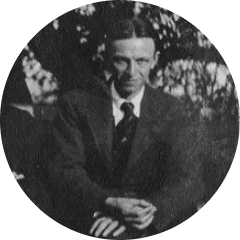William Force Stead
(1884–1967)
William Force Stead (1884–1967), poet, critic, diplomat, clergyman, was educated at the University of Virginia and served in WW1 as Vice Consul at the American Foreign Service in Liverpool. After working for a while in Florence, he was appointed in 1927 Chaplain of Worcester College, Oxford, where he became a Fellow. While in England, he befriended literary figures including W. B. Yeats, John Masefield, and Robert Bridges, as well as TSE – whom he was to baptise into the Anglican Church in 1927. In later years, after living through WW2 in Baltimore, he taught at Trinity College, Washington, DC. Publications include Uriel: A Hymn in Praise of Divine Immanence (1933), and an edition of Christopher Smart’s Rejoice in the Lamb: A Song from Bedlam (1939) – a work which he discovered.
TSE wrote a testimonial on 4 Dec. 1938 (sent to the Dept. of English, University of Cairo, on 9 Dec. [Beinecke]):
I have known Mr. William Force Stead for over eleven years and count him as a valued friend. He is, first, a poet of established position and an individual Inspiration. What is not so well known, except to a small number of the more fastidious readers, is that he is also a prose writer of great distinction: his book [The Shadow of] Mt. Carmel is recognised as a classic of prose style in its kind. And while the bulk of his published writing on English literature is small, those who know his conversation can testify that he is a man of wide reading and a fine critical sense.
Mr Stead is, moreover, a man of the world in the best sense, who has lived in several countries and is saturated in European culture. By both natural social gifts and cultivation, accordingly, he has a remarkable ability of sympathy with all sorts and conditions and races of men.
I would say finally that I know from several sources, that Mr Stead was most successful as a teacher of young men at Oxford; that he gained both the affection and the respect of his students; and that he exercised upon them a most beneficial influence. He has the scholarship necessary to teach English literature accurately, and the personal qualities necessary to make the subject interesting to his pupils; and I could not recommend anyone for the purpose with more confidence.
See ‘Mr Stead Presents An Old Friend’, Trinity College Alumni Journal 38: 2 (Winter 1965), 59–66; George Mills Harper, ‘William Force Stead’s Friendship with Yeats and Eliot’, Massachusetts Review 21: 1 (Spring 1980), 9–38; David Bradshaw, ‘“Oxford Poets”: Yeats, T. S. Eliot and William Force Stead’, Yeats Annual 19: Special Issue: Yeats’s Mask, ed. Margaret Mills Harper and Warwick Gould (2013), 77–102.
